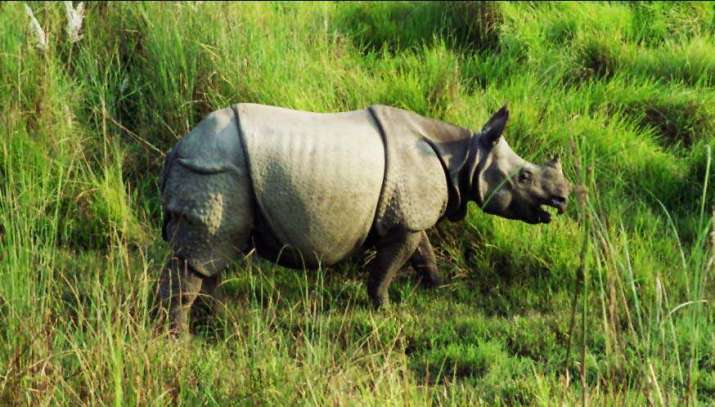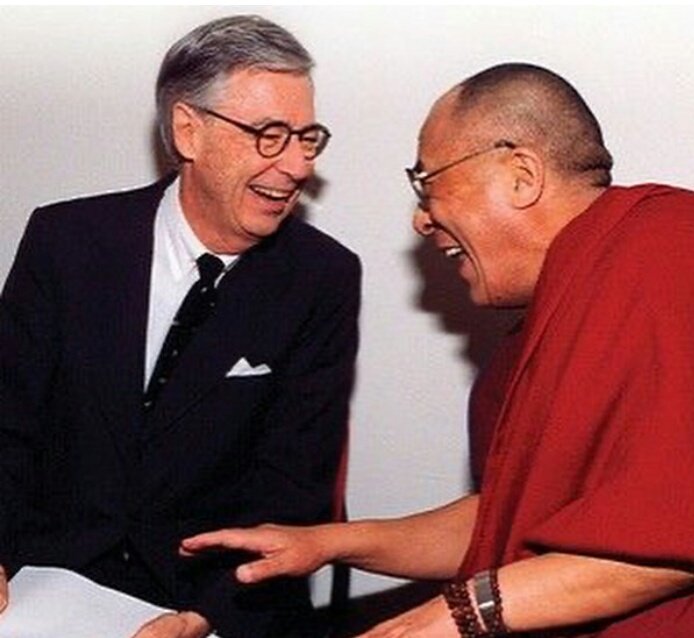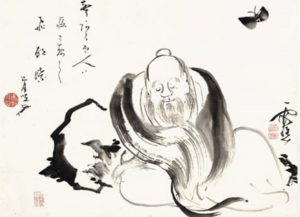
In 2009, while on an informal break from my PhD studies in Buddhist ethics from the University of London, a friend in Montana and I sat down to teach ourselves Pali, the sacred textual language of Theravada Buddhism. My friend, Matt, was and is a true natural, an autodidact of the highest degree. I am not, so his leadership in our study schedule and methods was most welcome.
One of his methods that I found most innovative at the time was to tell a story when learning a new word, ideally a funny one with bold imagery. So akasa, the Pali word for sky, was memorized with the image of, “a castle floating in the sky.” The Pali term rasa, which denotes the faculty of taste, was memorized by imagining Forest Gump offering us a handful of tasty rice—heard imaginatively with his southern drawl.
Another one that I remember well was khaggavisana, or rhinoceros, which was remembered with the exacerbated question of whether buying an entire rhino would “clog a Visa? Nah.” Keep in mind, the purpose wasn’t to make sense. In fact, the sillier and more mentally engaging, the better—within reason.
Along with the often ridiculous stories and other mnemonics used to learn the language, the image conjured by the Buddha of wandering alone like a rhinoceros—or rhinoceros horn, commentators and scholars have debated this for centuries—has stayed with me ever since.*
On all three steps of the three-fold path: ethics, meditation, and wisdom (Pali: sila, samadhi, and panna) one can understand that being alone can at times be very helpful. Alone, one is less likely to be tempted by the usual objects of greed: keeping up with material things and fashions of those around you. Alone, one is less likely to encounter the kinds of anger that arise in our everyday lives, such as when a person cuts us off on a sidewalk or in traffic or a loved one or friend devises plans that contradict our own without asking.
Meditation, too, is facilitated through the lack of conversation, which fuels a discursive and busy mind. On the contrary, the noise in nature—such as the birds, frogs, and ocean waves that surround my current home—simply draw the mind to hearing in the present moment, rather than mentally cataloging, discussing, or arguing.
And lastly, the wisdom of time alone can probably be best described in terms of its expansiveness. The turning around-and-around of everyday events in our life that we do so much begins to disappear. And, like the rhinoceros, we become simply at home in ourselves and our surroundings. In the discourse collecting some of the Buddha’s short poetic verses on wandering alone like a rhinoceros, these qualities come to life:
For a sociable person
there are allurements;
on the heels of allurement, this pain.
Seeing allurement’s drawback,
wander alone
like a rhinoceros.
Free from longing, finding no pleasure
in the world’s sport, love, or sensual bliss,
abstaining from adornment,
speaking the truth,
wander alone
like a rhinoceros.
Without resistance in all four directions,
content with whatever you get,
enduring troubles with no dismay,
wander alone
like a rhinoceros. (Khaggavisana Sutta: A Rhinoceros)
The Buddha makes himself clear, however, that the end goal is not to totally cut ourselves off from the world. The point is simply that we should be discerning about the people with whom we surround ourselves. As Aristotle observed some years after the Buddha’s life, humans are by nature social animals. And Kant, my favorite Western thinker, described our moral development as arising out of our “unsocial sociability,” that is, through needing to reason and better understand ourselves and our world precisely through our conflicts with other people.

So we enter into conversation and relationship, seeking those who would challenge us to be better and help us do so. If we find those around us giving rise to mere distraction or to elevated greed and aversion, we must realize that we are better off alone.
If you gain a mature companion,
a fellow traveler, right-living & wise,
overcoming all dangers
go with them, gratified, mindful.
If you don’t gain a mature companion,
a fellow traveler, right-living & wise,
wander alone
like a king renouncing his kingdom,
like the elephant in the Matanga wilds,
his herd.
We praise companionship—yes!
Those on a par, or better,
should be chosen as friends.
If they’re not to be found,
living faultlessly,
wander alone
like a rhinoceros.
Seeing radiant bracelets of gold,
well-made by a smith,
clinking, clashing,
two on an arm,
wander alone
like a rhinoceros. (Khaggavisana Sutta: A Rhinoceros)
This is by no means easy work. Just as one is attracted to the beauty of gold bracelets, we are drawn to people. The discourse even concludes on a warning along these lines:
People follow & associate
for a motive.
Friends without a motive these days
are rare.
They’re shrewd for their own ends, & impure.
Wander alone
like a rhinoceros. (Khaggavisana Sutta: A Rhinoceros)
In the midst of this strange time, our lives altered by a global pandemic, it is clear that many are suffering in their isolation. The tension between our social nature and the public health measures put in place around the world can be immense. Some of us are lucky, having found ourselves in isolation with family, friends, and colleagues who are on par, or better, than we are. Others are alone and are happy to use the time for personal growth and projects.
For those struggling, it might help to know that a certain amount of aloneness can be beneficial to the path; keeping in mind that we have difficulties that require help from others and being gentle with ourselves should such needs arise. In the UK, some 30 organizations have co-written a letter to prime minister Boris Johnson detailing mental health needs that are certain to arise due to the unexpected impact of the coronavirus pandemic and resulting lockdowns.
Paradoxically, our aloneness in this time is an act of social kindness. We are pulling ourselves out of the transmission chain of a terrible, and at times deadly, virus. While many of our impulses draw us back together—which eventually will be perfectly safe and wonderful—this period of aloneness can for many be a blessing, an opportunity to show solidarity from across the great sky, to cultivate gratitude for or reevaluate the relationships of those with us, or to taste the waters of contentment borne of carefully enduring troubles without dismay.
* Jones, Thomas Dhivan. 2014. “Like the Rhinoceros, or Like Its Horn? The Problem of Khaggavisāṇa Revisited.” Buddhist Studies Review. 31.2. 165–78.
See more
Khaggavisana Sutta: A Rhinoceros (Access to Insight)
The Ethics of Social Distancing (The Philosophers Magazine)
Coronavirus: Youth mental health ‘needs recovery plan’ (BBC)












